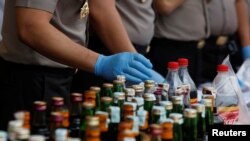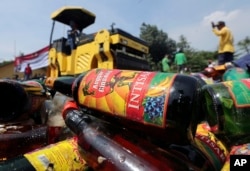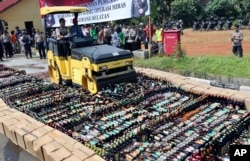The more than 100 deaths across Indonesia this month related to bootleg alcohol highlight Indonesia’s intractable problems with illegal and homemade liquor. There is a large black market for alcohol, which is highly taxed in the Muslim-majority nation, especially since 2015, when Indonesia banned the sale of alcohol at convenience stores and mini-marts.
Thirty-one people recently died in Jakarta, as well as dozens of others in Java and Kalimantan islands. The West Java city of Bandung declared a state of emergency Tuesday. All this has led some investigators to suspect a specific bad batch, according to a report by the French News Agency AFP. But so far they have not pinned any single distributor.
Police have, however, arrested at least seven individuals, one of whom admitted that his recipe for oplosan, a term for home-brewed alcohol cut with non-food ingredients that have not gone through the distillation process, included mosquito repellent, cough syrup, and pure alcohol.
Systematic restrictions
“With alcohol being expensive and difficult to obtain, Indonesians drink five times more unrecorded than legally purchased and distributed liquor,” according to a 2016 report from the Center for Indonesian Policy Studies. The report suggests that “the Indonesian government needs to worry less about the consumption of legal alcohol … [and] put more emphasis on reducing the production, circulation and consumption of counterfeit alcohol in Indonesia.”
The reported death toll from bootleg liquor increased from 149 deaths between 2008 and 2012 to 487 deaths between 2013 and 2016, according to further CIPS research.
“With the ban [in place], the market niche for recorded alcohol previously covered by mini-marts and convenience stores has been taken over by numerous undocumented alcohol kiosks, which have secretly been purveying potentially more harmful, unregulated alcohol products, including illegal moonshine and oplosan,” said Sugianto Tandra, a CIPS researcher.
“The tragic deaths caused by consumption of oplosan that we have seen over the past two weeks took place in outskirt areas of Indonesian cities where, thanks to the 2015 crackdown, regulated alcohol products are now harder to find and less affordable to many, especially those low-income consumers who comprised most of the recent victims.”
Threat of prohibition
The Indonesian parliament has long debated a total prohibition bill that was spearheaded by Islamist parties, but it has stalled until now at the highest levels. Indonesia’s largest Muslim organization, Nahdlatul Ulama, came out against the ban last year after conducting independent research into oplosan sales. NU’s research unit found that more than 70 percent of surveyed teenagers could easily get cheap oplosan on the street, which the group considers a major public health hazard.
“No one has ever died from drinking beer, but our young people could die if they drink bootleg liquor,” said NU researcher Abdul Wahid Hasyim. “As a Muslim, of course, alcohol is still haram (forbidden). But this is not about halal or haram, this is about saving our younger generation, this is about making an effective policy,” he said.
Beyond keeping the prohibition threat at bay, Indonesia also must figure out how to actively combat oplosan and moonshine consumption.
“Now it is the right time for the government to make good of all the well-intended aims of public and youth protection,” Sugianto said. “What we’ve seen is that the deaths caused by consumption of unrecorded alcohol already increased to almost 900 in the past decade (2008-2018). So the problem lies there: with the distribution and consumption of oplosan alcohol. The fight therefore should be directed against oplosan alcohol, not recorded alcohol.”
Aan Ansori, the current head of NU’s research division, agreed. “Oplosan is uniquely dangerous because those beverages are not at all regulated by the [federal] Drug and Food Control Agency,” he said. “The alcohol levels that are usually found in oplosan are far above the acceptable threshold, which is why they claim so many victims.”






